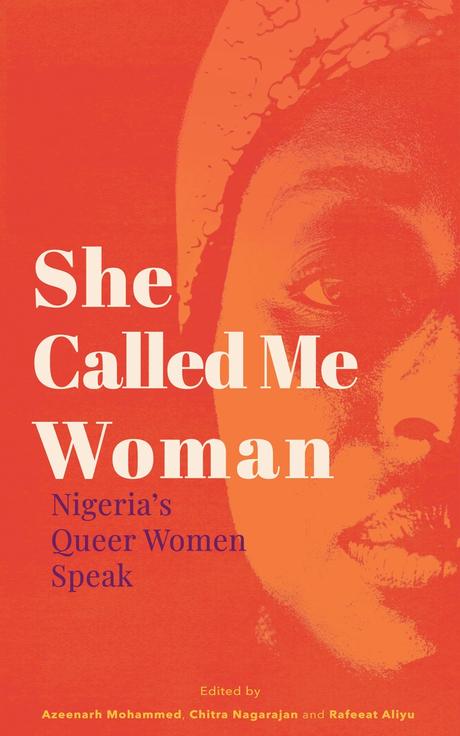'These true stories are beautifully told, the pain and honesty and hope and joy in these accounts is strong like a song' - Stella DuffyI first heard about the new anthology from Cassava Republic Press, She Called Me Woman: Nigeria's Queer Women Speak, last year while at the launch of Africa Writes Festival at the British Library. Back then I didn’t know much about it – other than it was an edited collection of stories from queer women living in Nigeria. I was intrigued. Extremely intrigued! I also had many questions – as I always do. When would it be out? What type of queer women's voices would be heard? How would a collection like this be received in Nigeria – particularly as same-sex relationships are illegal in the country?
Fast forward to November 2017, and I see a tweet from Mona Elthawy - who was then at Ake Festival in Nigeria - with an image of a pamphlet of the forthcoming anthology. From that tweet, I knew the anthology would be out some time in 2018, but that was all I knew. I was still intrigued. Still extremely intrigued! Well, I am happy to say that I need to be intrigued for only a little longer as She Called Me Woman: Nigeria’s Queer Women Speak launches April 24 2018. Can.not.wait! While we wait, here is the cover ... and a bit more about the collection - courtesy of Cassava Republic Press.

Edited by Azeenarh Mohammed, Chitra Nagarajan and Rafeeat Aliyu She Called Me Woman has been described as ‘a ground-breaking collection of 25 first-hand narratives from a cross section of queer Nigerian Women’. It’s also said to be a ‘timely and brave feminist collection’, ‘the first of it kind in Nigeria’ which ‘will illuminate and immortalise the oft- neglected stories of queer women in Africa, and challenge stereotypes about the lived reality of being lesbian, bisexual and trans women in Nigeria’, and ‘will invite conversation and bring much-needed visibility to the existence of queer women on the continent’.
As stated in the press release:
… these narratives give the reader access to the narrators’ innermost thoughts and explore what it means to be a queer woman within Nigeria’s often deeply conservative communities.
Through their words, we learn of first loves, heartbreaks and familial pressure; the struggle to reconcile religion, sexuality and culture; the battle to be comfortable with one’s gender and sexual identity within communities that can be hostile and intolerant; the socioeconomic pressures and universal difficulties faced by women in Nigeria.
'She Called Me Woman' restores agency, presence and humanity to Nigeria’s queer women by providing a platform from which they speak for themselves. Women from a wide range of class, religion and educational backgrounds take the reader on a sometimes celebratory, sometimes troubled but always insightful journey into their everyday life. The book covers the experience of queer women from across Nigeria, with narrators coming from Maiduguri, Zamfara, Imo, Oyo, Abuja, Plateau, Lagos, Ondo and more. It restores balance in the discussion on sexuality and gender, which can unfairly favour queer men. It brings into mainstream consciousness the existence and issues of queer women in Nigerian society, ensuring that their stories are told and their voices heard.For one of the co-editors, Azeenarh Mohammed – trained lawyer and a queer, feminist, holistic security trainer - this collection:
... is vital because queer people have agency and voice to speak for themselves and tell their story, unmediated. It shows us in our glorious humanity that people aren’t used to seeing. My hope is that in reading this book, people will understand that Nigerian queer women exist and we’re exactly the same as everyone else with dreams, hopes and aspiration to do well and be happy.While for another co-editor, Rafeeat Aliyu – who works in communication and research (on sex and sexuality in both modern and historical Nigeria):
This book is important to me because as someone who looks for clues on women's sexuality in Nigeria’s history, I am often frustrated by the way scholars have painted a heteronormative picture. When we become history, no one will be able to say, "there's no proof of homosexuality in Nigeria" because of the existence of this book and others like it.
I love that the collection deliberately focuses on queer women, ‘as female voices tend to be excluded from conversations about queerness, dominated as they are by the experiences of queer men’. For anyone asking - a companion anthology of queer men’s narratives is planned for release in 2019. To gain access to, and collect, these 25 accounts - Mohammed, Nagarajan and Aliyu travelled across Nigeria, recording one-on-one interviews with women who felt comfortable participating. I also love that the cover itself also seems to be deliberate and has been well thought out:
Designed by Maia Faddoul, the cover image features a faded-out picture of a Nigerian woman, gazing straight at the reader as if calling on them to look at her and acknowledge her existence. The use of varied colours on the cover calls attention to the diversity of voices and narratives in the collection. The subtitle is purple - a key color in queer communities that has variously been used to represent lesbian pride, the spirit of the LGBTQ community, and a challenging of gender norms in its blend of blue and pink.Cassava Republic Press consistently gives us stories and narratives that 'change the way the world thinks about African writing', and I really and truly cannot wait to read this very exciting collection from Nigeria's Queer Women.

